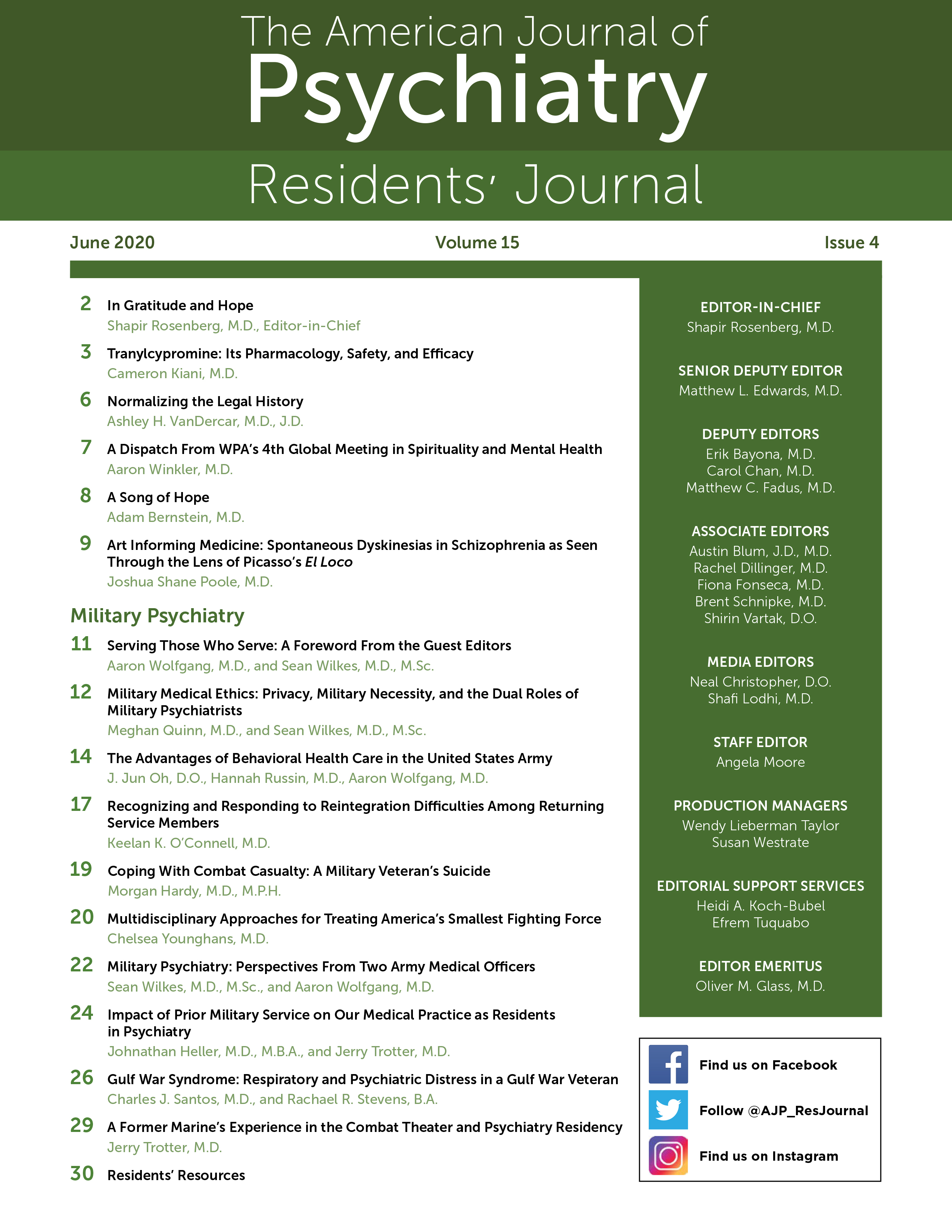Welcome and thank you for reading the American Journal of Psychiatry Residents' Journal (RJ). The June 2020 issue features a wonderful selection of articles on a variety of general psychiatry topics, in addition to a theme section devoted to military psychiatry. This issue complements two earlier guest-edited issues from this publication year, one dedicated to neuropsychiatry and the other to psychiatry and the visual arts. I applaud the efforts of the current guest editors Drs. Sean Wilkes and Aaron Wolfgang, along with earlier guest editors Drs. Lauren Lepow, Eric Goldwaser, and Badr Ratnakaran for the hard work and dedication involved in bringing their ideas to fruition. Readers may be interested to know that it takes 1–2 years of work for a guest-edited theme issue to move from idea proposal to publication. As this was the third guest-edited issue in the year, some sense of the planning that is involved should be apparent.
Like all of the RJ's published products, much labor is performed behind the proverbial scenes. As my tenure as Editor-in-Chief draws to a close, I thank this year's editorial board and ad hoc reviewers for their commitment and efforts. This all-volunteer team devoted hours each week to reading and editing submissions and to corresponding with authors and each other about manuscripts and podcasts. In a supportive and professional way, they advise, guide, and inspire authors, all of whom are fellow trainees. I have been witness this year to their personal and professional growth and am thrilled that several of this year's board members have been appointed to positions next year. I thank deputy editors Drs. Carol Chan, Matthew Fadus, and Erik Bayona for their dutiful service past and present to the RJ. I am indebted to associate editors Drs. Austin Blum, Rachel Dillinger, Fiona Fonseca, Shirin Vartak, and Brent Schnipke for their tireless work this year. Drs. Neal Christopher and Shafi Lodhi worked to bring new and creative means of connection to psychiatric trainees through podcasting and social media, and I acknowledge their efforts. Ad hoc reviewers Drs. Aaron Winkler, Margaret Wang, Jonathan Miller, and Eric Goldwaser contributed their expertise and enthusiasm in countless ways, for which I am sincerely appreciative.
The
RJ now enjoys broad geographic coverage, reaching all psychiatric training programs in the United States and Canada, as well as medical students at many of these institutions. Our social media presence—as measured by followers on Facebook and Twitter—is at an all-time high. Our podcasts are eagerly anticipated and enjoyed. Owing to the
RJ's growth in submission volume, the 2020–2021 editorial board was expanded to include three deputy editors, seven associate editors, and three media editors. A record number of applications was received for these spots. Congratulations to all the new board members, who are announced on page
10!
I confidently hand over leadership of the RJ to next year's Editor-in-Chief Dr. Matthew Edwards and Senior Deputy Editor Dr. Austin Blum. An accomplished writer, historian, and future forensic psychiatrist, Dr. Edwards will enter his third year of excellent service to the RJ. Dr. Blum, a physician, attorney, and former law review editor, brings his superb gifts for writing and editing, and a powerful work ethic, to his second year of service on the board.
I thank Editor-in-Chief Emeritus Dr. Oliver Glass for finding and nurturing my writing, editing, and leadership abilities and for inviting me to the RJ board two years ago. I hope my efforts to grow the RJ and mentor its authors and editors have been equal to or exceeded the privilege entrusted to me. I also extend my gratitude to the American Psychiatric Association publishing team who design the RJ's layout and facilitate its quarterly publication. They include Angela Moore, Demarie Jackson, Heidi Koch-Bubel, Efrem Tuquabo, Wendy Taylor, Susan Westrate, Michael Pogachar, and Michael Roy, Editorial Director for APA Journals, for whose continued support I am grateful.
As is the case in learning and practicing medicine and psychiatry, processes and relationships matter. In a medical training environment all too often plagued by incivility, abuse, neglect, and hierarchy, it is my hope that those involved with the RJ as readers, authors, and editors, are exposed to and benefit from its culture of learning, writing, and doctoring—one that fosters creativity, inclusivity, humanism, and compassion. In both our words and actions may we foster healing and hope for our patients and each other.
